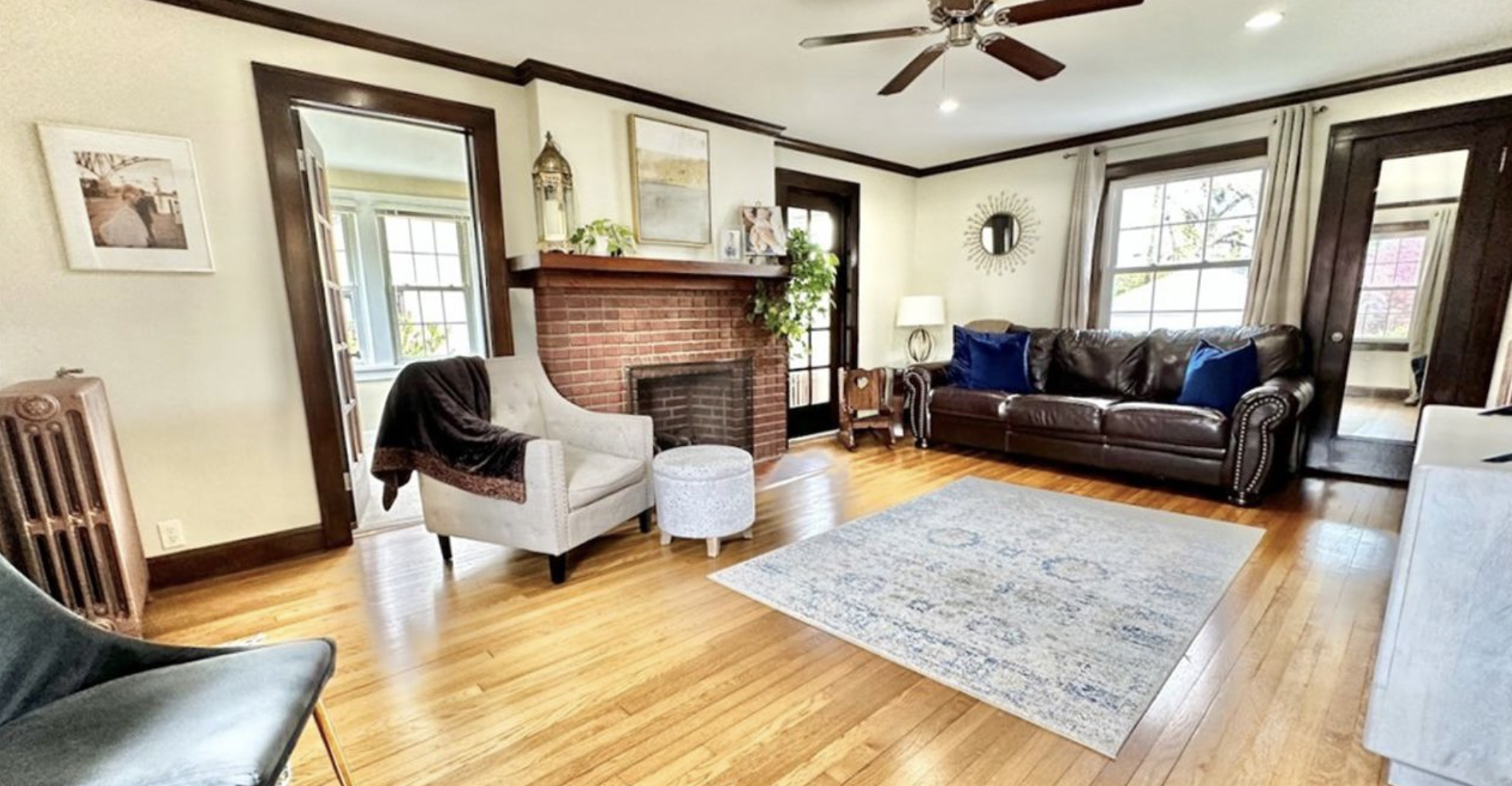Real estate investing offers promising returns and consistent cash flow. But who has time to find an agent they trust, properties with good return rates, and a property management company?
With Roofstock, both accredited and non-accredited investors can gain entry to real estate investing quickly and easily.
Roofstock is an all-in-one single family real estate investing tool that lets you diversify your portfolio and gain exposure to the real estate market without doing the dirty work.
Want to find out more? In this Roofstock review, you’ll learn:
- What is Roofstock?
- Is Roofstock legit for real estate investing?
- Is Roofstock worth it?
By the time you’re finished reading, you’ll have a much better idea of how the platform works and whether or not it’s the right fit for you.
Is Roofstock Legit and Worth It?
The Bottom Line: Yes, Roofstock is legit and worth it in 2025.
Roofstock offers accredited and non-accredited investors an easy-to-use online investing tool that gives them access to the real estate market with a minimum initial investment.
How can you tell Roofstock is legit? Check out their track record since 2016:
- Over $5 billion in transactions
- Access to more than 70 promising markets
- Used by over 400 investors for single-family rental (SFR) investing
In addition to a great track record, Roofstock has plenty of great tools and resources for investors. Let’s dig into them in this Roofstock review…
What Is Roofstock?
Founded in 2016, Roofstock is a licensed online real estate brokerage that specializes in single-family rental (SFR) real estate investing.
Roofstock eliminates the typical geographical barrier to investing your hard-earned dollars in real estate. Here are just some of the platform’s selling points:
- Vertical integration of tools and services including a financial analysis calculator, Roofstock’s proprietary neighborhood rating system, Stessa online accounting, and Great Jones property management
- Curated investment properties in affordable markets
- Eliminates the geographic barriers typically associated with real estate investing
- Roofstock One: a real estate investment trust (REIT) for single-family rentals available at a lower cost
With agents on the ground and access to financial information as well as Roofstock’s proprietary neighborhood ratings, investors can rest assured they are putting their money into a high-quality investment property.
Roofstock currently operates in more than half of the United States; for investors who live in expensive markets like Los Angeles or New York, it’s the perfect opportunity to dive into more affordable markets like the Midwest or the South.
Roofstock Features:
- Assets: Roofstock deals exclusively in single-family real estate. They differentiate themselves from competitors by curating turnkey, occupied SFR properties for investors.
- Minimum Investment: While the Roofstock marketplace does not have a minimum investment, Roofstock One (which is only available to accredited investors) has a minimum investment of $5000.
- Average Annual Returns: Annualized returns with Roofstock can vary from approximately 6% all the way up to 20%, however, it depends on the specific property you purchase.
- Investment Fees: Selling fees total 3% or $2500, the larger of the two. Buying fees total 0.5% or $500, the larger of the two. Roofstock One users can expect to pay 0.5% in AUM (Assets Under Management) fees.
- Account Types: Roofstock offers taxable accounts as well as self-directed IRAs.
- Investment Terms: Unfortunately, Roofstock is an illiquid investment. Roofstock One users must hold shares of property for at least 5 years; there is currently no secondary market for trading shares. Individual property terms will vary.
- Accreditation Requirement: Anyone can invest directly in Roofstock rental properties, but Roofstock One is only available to accredited investors.
How Does Roofstock Work?
If you want to know how Roofstock works, it’s actually pretty simple.
Once you sign up, you build an investor profile, which involves answering questions like:
- Previous experience
- Accreditation status
- Desired investment amount and timeline
- Preferred region
- Risk tolerance
From there, you’ll be taken to the Roofstock marketplace, where you’ll see property recommendations based on your profile preferences. Once you find a property you’re interested in, you can click for more information or to move forward.
How does Roofstock work in terms of ownership? Roofstock doesn’t actually own the properties they list — rather, they earn money through commissions. But they take the vetting process very seriously.
All the properties listed by Roofstock are carefully screened.
In addition to tenant and neighborhood screenings, Roofstock has your back with fundamental investing analysis. On the Roofstock marketplace where investors can buy into single-family rentals, they provide a tool where investors can input their financing to calculate:
- Annualized return
- Cap rate
- Gross yield
- Cash flow
- Estimated Appreciation
Roofstock One, the platform’s premium service, is a little different. It allows accredited investors to buy tracking shares of properties that have been purchased by Roofstock, LLC.
Important note about Roofstock One:
As an investor, while you can reap rewards, you do not actually own the property; Roofstock does. Investors simply own the rights to distributions and appreciation, meaning they can get skin in the game without excessive risk or capital expenditure.
Roofstock Fees & Pricing
Real estate brokerages typically charge an arm and a leg — around 6% — in transaction and commission fees. For this reason, many real estate investors get their licenses as agents to save on fees.
Roofstock attempts to solve this problem by offering low fees both on direct investments and on buying and selling REIT shares:
- Buying fees: Greater of 0.5% or $500
- Selling fees: Greater of 3% or $2500
- Roofstock One fees: Asset management fee beginning at 0.5%
Pros and Cons of Roofstock:
Pros | Cons |
Eliminates geographical barriers to real estate investing | Not available in all markets |
Provides assistance every step of the way (vetted real estate agents, financial analysis, and in-house property management services) | Can’t see properties in person before investing |
Fees are much lower than traditional real estate buying or selling costs | Roofstock One requires accreditation |
Possibility of immediate cash-flow from current tenants | $5,000 minimum deposit (For Roofstock One) |
One-year protection on vacant home purchases | Lacks liquidity (no secondary marketplace to trade shares on Roofstock One) |
Diversify with REITs on Roofstock One | |
Ability to invest in IRA |
Should You Use Roofstock?
So, is Roofstock legit and worth it in 2025?
Yes, Roofstock is definitely worth a shot for most investors.
Consider this: despite 2022’s dismal returns on the S&P 500 — an underwhelming -19.64% — SFRs fared much better. Based on Arbor’s SFR Investment Trends Snapshot from Q4 of 2022, occupancy rates held fast and rents increased over 5%.
With Roofstock’s comprehensive SFR tools and the ability to purchase shares in SFR portfolios, nearly everybody has something to gain.
You should use Roofstock if you:
- Want to diversify your portfolio with single-family rentals
- Live in an expensive housing market but would still like to diversify your portfolio with real estate
- Don’t have time to do financial analysis and deal with property management post-acquisition
Roofstock Alternatives:
Arrived | Fundrise | Yieldstreet | |
Overall Rating: | ⭐⭐⭐⭐ | ⭐⭐⭐⭐ | ⭐⭐⭐⭐⭐ |
Asset: | Residential real estate | Real estate, VC | Real estate, art, VC, private credit, & more |
Expected Returns: | 8%-20% | 6%-10% | 8%-20% |
Fees: | Sourcing fee: 3.5%-5% of property purchase price AUM fee: 0.125%-0.15% of property purchase price (quarterly) | Annual advisory fee: 0.15%Annual flat management fee: 0.85% | Annual management fee: 1%-4% |
Accreditation Requirement: | Accredited and non-accredited investors | Accredited and non-accredited investors | Primarily accredited investors |
Final Word: Roofstock Review
Roofstock is a fully comprehensive, all-in-one SFR investment platform. From financial analysis to neighborhood ratings to property management, Roofstock leaves little to be desired.
It’s a great platform for those who are new to real estate or for experienced investors who simply lack the time it takes to do all the legwork involved with managing a real estate portfolio.
As for drawbacks, there are a few, though they’re minor:
- Must be accredited to use Roofstock One
- You must buy into properties sight-unseen
So … is Roofstock worth it? In my opinion, its thorough vetting process, low minimums, and user-friendliness make it worth at least taking the time to check out the marketplace.
FAQs:
Is Roofstock a reliable company?
Yes, Roofstock is a legitimate and reliable company. Since its formation in 2016, the company has facilitated over $5 billion in transactions with over 400 users.
Can you make money on Roofstock?
Yes, investors can make a good return on their investment with Roofstock. Roofstock deals in the single-family rental market, offering both the ability to directly own and manage rentals as well as the option to purchase Tracking stock in SFR portfolios, or REITs.
What is the cost of Roofstock?
The costs of Roofstock are minimal compared to typical real estate dealings. Selling fees max out at 3%, purchasing fees never exceed 0.5%, and investors who participate in Roofstock One will get access to SFR REITs at a low asset management fee of 0.5%.
What is the average return on Roofstock?
Average annual returns on Roofstock vary based on the property you purchase, but historical returns have been somewhere in the range of 6% and 20%. Don’t let the lower end of the return rates scare you: single-family rentals with lower cap rates are indicative of lower-risk investments as long as you are willing to play the long game.
Where to Invest $1,000 Right Now?
Did you know that stocks rated as "Buy" by the Top Analysts in WallStreetZen's database beat the S&P500 by 98.4% last year?
Our July report reveals the 3 "Strong Buy" stocks that market-beating analysts predict will outperform over the next year.







